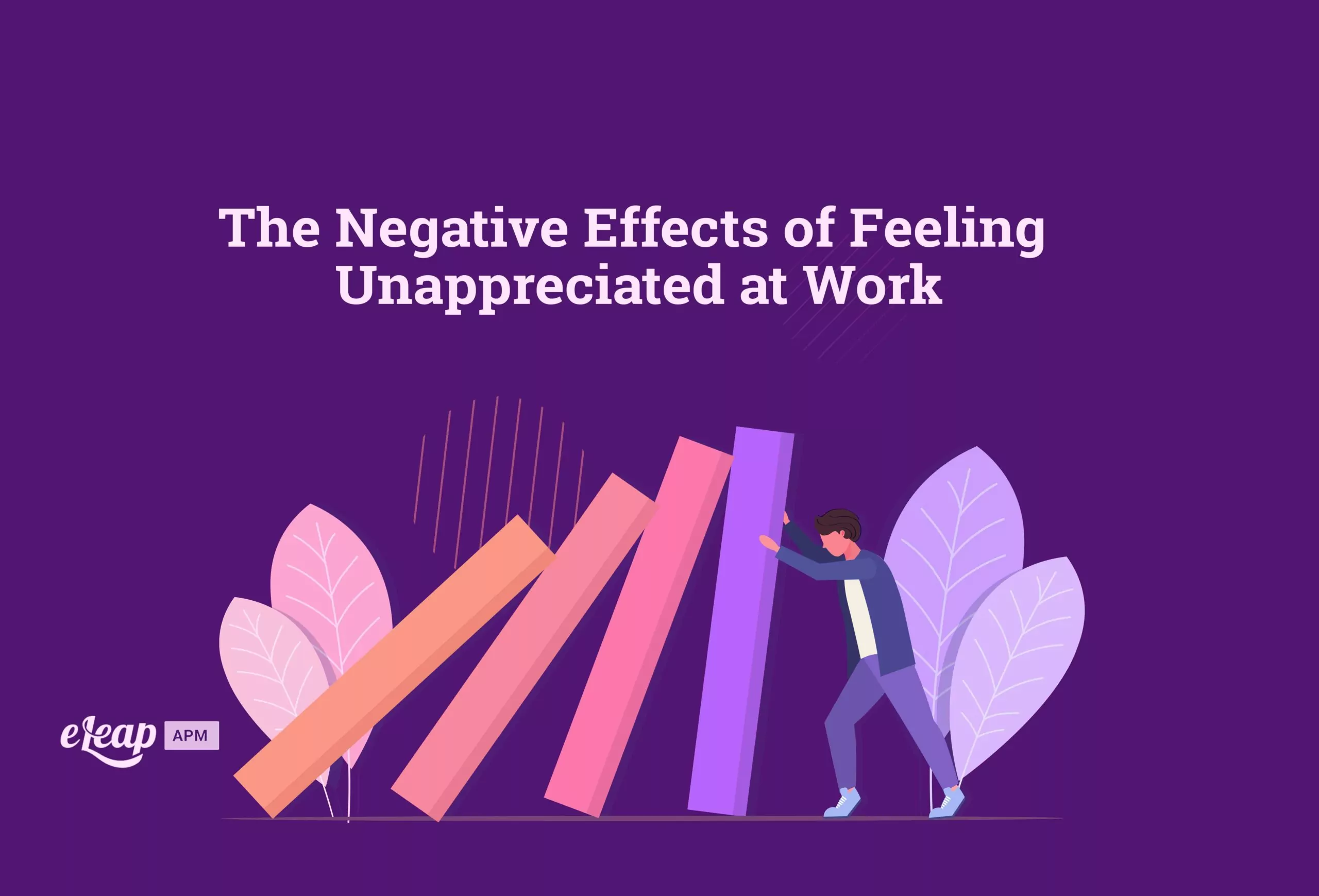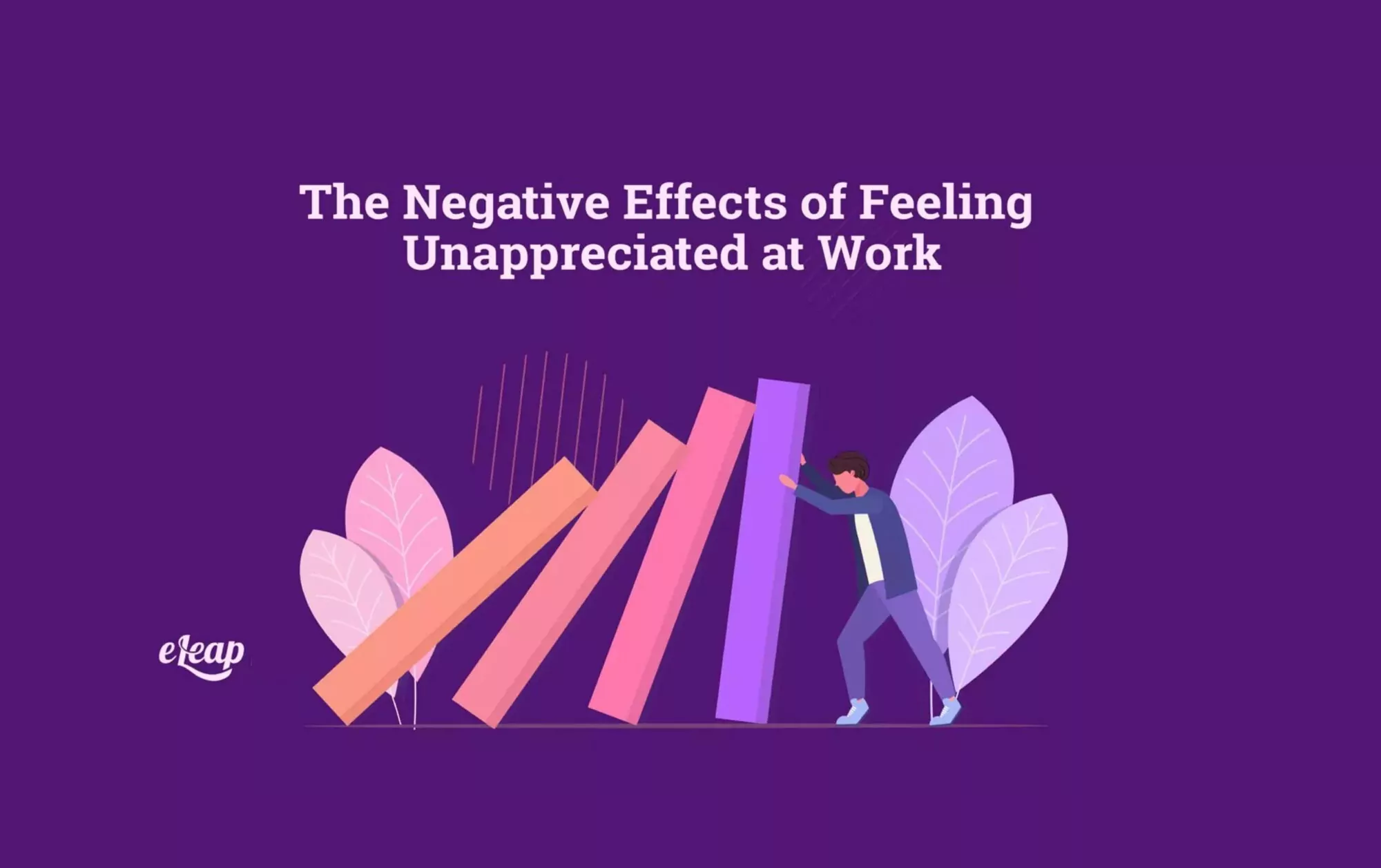The Negative Effects of Feeling Unappreciated at Work

Bosses are instrumental in the effects of feeling unappreciated at work or in employees feeling valued and respected. People leave their jobs every day all over the world. However, in reality, the main reason that people usually leave a position is because of a bad boss. Explore how eLeaP’s Performance Management Platform can simplify evaluations, boost productivity, and drive measurable results.
What makes a bad boss? People complain about and choose to leave bosses who:
- Ignore efforts toward improvement
- Don’t recognize hard work
- Criticize instead of affirming
- Concentrate on the negative instead of the positive
This means that people don’t quit because of low pay or too much work. Instead, they seek out different employment because their bosses don’t appreciate or don’t recognize effort.
The famed psychologist Abraham Maslow created a hierarchy of needs to show our most basic human needs and desires. Close above food and shelter are validation and appreciation. When we feel connected to others and know that we matter, we are motivated to achieve and reach for our full potential.
This is an interesting application for the workplace because appreciation toward your employees costs nothing. However, not showing appreciation potentially costs you millions over many years.

More Psychology to Prove the Point
Examples help bring understanding. To further illustrate Maslow’s point that validation and connection motivate behavior, take the following study by Dan Ariely.
The MIT professor gathered three groups of people and gave them the simple task of matching identical pairs of letters on a piece of paper. They were then offered money to continue performing the same task. However, the money was less and less each time.
For the first group, the experiment director instructed them to label the paper with their names. Then, when they turned their papers in, he looked them over and said, “Great.”
The second group wasn’t instructed to add their names. The director simply piled the papers together without a glance.
The third and final group didn’t even get the pleasure of their completed work on top of the pile, though. The director took their papers and put them right through a shredder.
What did the results show? The people who received no recognition (the shredded group) needed twice as much money to continue than the people who were acknowledged, even with something as vague as “great.” The second group needed significantly more, as well.
People don’t want to be ignored. They want to matter.
What This Research Means for You
Your employees deserve to have their hard work recognized and affirmed. They deserve managers who notice them and guide them toward further success. When you ignore people’s efforts, you effectively shred their motivation.
Many financially wealthy companies offer big bonuses, perks, and benefits to employees. In return, team members are required to work long hours and perform over and above traditional expectations. However, Ariely’s research shows that money can’t buy hard work—at least, not without appreciation.
Unhappy employees not only require more money to stay in unsatisfying positions, but they don’t work as proficiently, either. This brings about lower quality work which hurts businesses from every angle.
People who feel unappreciated at work often exhibit patterns such as:
- Showing up late
- Leaving early
- Wasting time at their desks/in their offices
- Taking advantage of expense accounts
- Not offering their best to clients
Take Some Pages from the Nonprofit World
Nonprofit organizations aren’t striving to make millions. They are often under tight financial strain, utilizing few resources and team members. Why, then, do they put so much effort into recognizing their volunteers?
Essentially, it’s necessary to keep volunteers on board. Even though volunteers, by definition, aren’t paid for their efforts, they are happy to give their time when they’re recognized. Furthermore, they don’t expect to ever be compensated financially as long as they are given appreciation.
So, how do you show people you appreciate them if not through money? Nonprofits use several techniques. Which of these ideas stick out to you or seem that they might work for your employees?
- Thank you notes
- Visits from high-ranking personnel
- Thoughtful gifts
- Flowers
- Nominal gift cards or certificates for comped services
Tailor Your Efforts to Your Particular Company
It’s important to get to know your employees so that you know what each person’s language of appreciation is and how to recognize your group as a whole. Depending on your colleagues and your corporate culture, certain ideas have a significant impact.
- Give direct, thoughtful feedback soon after successful projects.
- Take people out to lunch or a celebratory dinner after big wins.
- Choose individualized gifts with nods to the person’s likes or that make work more enjoyable.
- Write a formal letter on professional stationery thanking someone for their efforts.
- Recognize someone’s contributions in a group setting to show you value their work.
However, take care not to overdo it. Recognition isn’t received with its full potential when everyone gets it all the time. Your responses to people’s hard work should come with concrete positive feedback.
Recognition in certain companies often becomes rote and thoughtless. Take ‘Employee of the Month’ programs, for example. Many people simply feel that they have to wait their turn and will be recognized with, “Jane Doe is a valued team member. She brings a lot to the company.” What does this mean?
Programs that recognize hard work and over-and-above effort rather than checking people off of a list are more effective. People who accept mediocrity and aren’t ever recognized learn to improve or put their jobs at risk.
That being said, it’s important to recognize efforts toward improvement. Every person comes into their position with different skill levels and experiences. If someone is always recognized as “the best of the best,” others might feel as if there’s no point in trying since they can’t compete.
Think about the kids in school who were always rewarded for their 4.0+ GPAs and lettering in every sport available. If this wasn’t possible for you, didn’t you still want recognition for bringing up your grades and joining a team?
Every person has potential and skills that are beneficial to your company. Search out opportunities to recognize every person for their unique offerings. This prevents people from feeling unappreciated at work and shows them that you value their performance.
Specific Ideas to Show Your Appreciation
There are plenty of ways to show your appreciation to employees. Keep things interesting and develop a range of tools that move from easy, basic thank you’s to large-scale incentive programs. Whatever it is, learn your employees’ languages of appreciation and offer gestures in multiple ways.
- Write personalized thank you notes or letters of appreciation that you leave on people’s desks or in their company mailboxes.
- Give employees shout-outs in group emails or during staff meetings so that other people hear your praise.
- Draw up certificates recognizing the completion of projects or goals achieved.
- Allow people to choose rewards from a particular catalog filled with items that make work more enjoyable (e.g., a new chair, desk organizer, ergonomic cushions, blue light-filtering glasses, etc.)
- Reward people with gift cards or certificates for spa days, exercise classes, or museum entrances.
- Invest in company swag to encourage pride in your business. Sweatshirts, water bottles, messenger bags, sunglasses… these give people a connection to their work and also spread the word about who you are!
- Show that you are willing to do the work, too! Get your hands dirty with tasks that most managers scoff at.
- Organize group activities at restaurants, shows, the beach, or other vacation-type places to encourage relationships and fun memories.
- Recognize milestones and anniversaries; your veteran employees are one of your most valued assets!
Not Appreciating People Costs You Money
What happens when you leave people feeling unappreciated at work? They leave. What happens when people leave? You need to replace them.
High rates of employee turnover are incredibly expensive. It costs time, money, and labor to recruit, hire, and train new team members.
Furthermore, the employees who stick around feel the effects of negativity and underappreciation. These negative feelings leak out to the new team members, making it harder for people to join the team and stay positive.
Remember that any employee stuck in a toxic culture that doesn’t value them also asks for more money and benefits to stay. Then, they don’t give their best work because they are unmotivated.
All signs point to the benefits of showing employees appreciation and value.
You Have the Power to Stop People Feeling Unappreciated at Work
You have plenty of tasks and obligations as a manager. This might seem like just one more thing on your plate. However, the more time and energy you invest into appreciating your employees, the better they’ll perform!
This translates into employees who bring more profit and benefit to your company. People who feel good about themselves and see their value and purpose work in a much better capacity. Then, they turn around and share that positivity with others, creating a beautiful ripple effect.